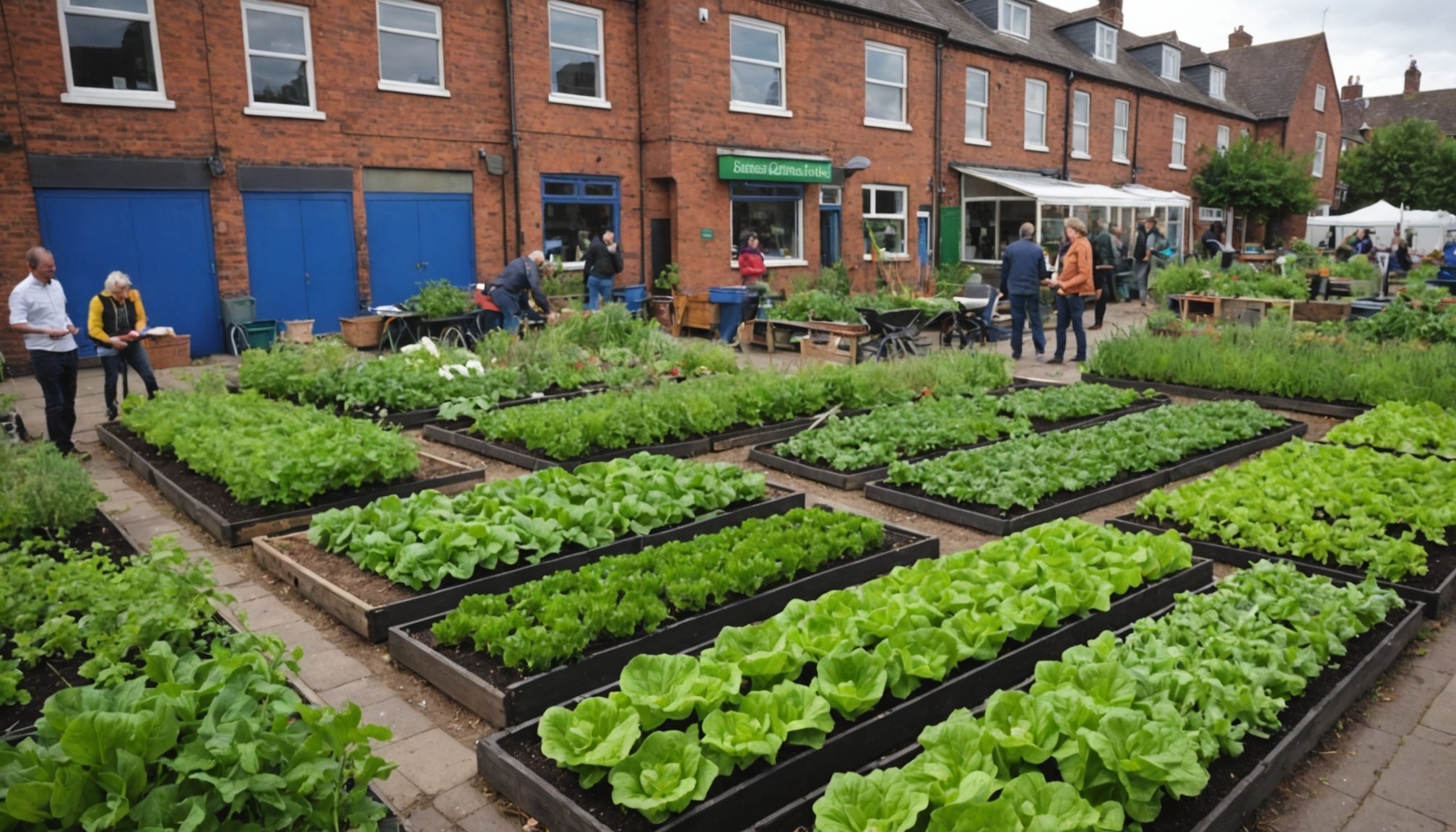Importance of Urban Agriculture in the UK
Urban agriculture plays a crucial role in re-imagining how we grow food and has practical benefits for urban settings. As cities expand, the importance of sustainable farming within urban environments becomes paramount. By utilizing rooftops, vacant lots, and community gardens, urban agriculture helps address the pressing need for food security and reduces the urban carbon footprint.
Sustainable farming practices within city landscapes contribute significantly to enhancing local ecosystems. By fostering biodiversity and reducing pollution, these initiatives create more resilient urban environments. Beyond environmental benefits, urban agriculture enriches local communities by providing fresh produce, promoting food equity, and creating green spaces that improve mental health and social integration.
In the same genre : Ultimate blueprint for establishing a vibrant creative coworking hub in the uk
Despite these advantages, urban farmers often face challenges such as limited space, soil contamination, and regulatory barriers. Urban farming techniques require innovative approaches, like vertical farming and hydroponics, to maximize yield in confined city spaces. Moreover, navigating local regulations and securing funding are additional hurdles that need addressing to scale urban agriculture projects effectively.
Community involvement and support are pivotal in overcoming these challenges. A shared vision and collaborative efforts among local residents not only sustain urban agriculture but also empower communities to transform their urban landscapes for future generations.
In parallel : Comprehensive blueprint for launching a uk yoga retreat: your step-by-step pathway to health and safety certification
Establishing a Farming Collective
Creating a farming collective involves several strategic steps that require robust collaboration and effective community farming practices. First, establishing a shared vision helps unify efforts and outlines the collective’s primary goals. Members should consider the scale and type of urban agriculture projects they want to pursue, whether it’s community gardens, vertical farms, or rooftop farming. Clearly defining roles and responsibilities within the collective is essential. This division ensures activities such as planting, maintenance, and marketing are managed efficiently.
Community involvement remains crucial in this process. Engaging local residents can inspire a sense of ownership and commitment to the collective’s success. Fostering partnerships with local businesses, schools, and environmental groups can also boost resources and knowledge sharing.
Having a shared vision can also aid in navigating challenges like funding and regulatory hurdles. Transparent communication and democratic decision-making within the group can enhance the resilience and adaptability of the collective. Regular meetings and feedback sessions ensure all members are aligned and that the group progresses effectively. Successful farming collectives harness diverse skills and ideas, transforming urban spaces into productive, environmentally conscious hubs that benefit the entire community.
Best Practices for Urban Farming
Urban farming is integral for sustainable agricultural systems within city environments. Implementing innovative urban farming techniques enhances food production efficiency and quality. Sustainable practices, such as vertical farming and hydroponics, are gaining popularity due to their ability to maximize small spaces and conserve resources. Employing these methods improves yield and minimizes environmental impacts.
Soil Management Techniques
Maintaining soil health is vital for urban farming success. Techniques like composting and mulching improve soil fertility and structure. Urban gardeners use raised beds to avoid soil contamination and achieve better drainage. These strategies support healthy plant growth and increase yields.
Crop Selection and Rotation
Choosing suitable crops is essential in urban settings. Opt for plants that thrive in confined spaces and have short growth cycles, like leafy greens and herbs. Crop rotation prevents soil nutrient depletion by changing the plant species grown in each season. This practice enhances soil health and reduces the need for chemical fertilizers.
Pest Control Strategies
Urban farmers should adopt eco-friendly pest management strategies. Using natural predators and barriers mitigates pest issues without harming the ecosystem. Regular monitoring allows timely intervention, which is crucial for maintaining healthy crops. Adhering to these best practices ensures sustainable, productive urban farming.
Legal and Regulatory Considerations
Understanding the urban agriculture laws and zoning regulations is crucial for successful urban farming within the UK. Farmers need to be familiar with local zoning laws, which dictate where urban farming can take place and under what conditions. These regulations can affect everything from the size of your farm to potential expansions.
Compliance with health and safety standards is essential, particularly when producing food in urban settings. This includes ensuring that produce meets hygiene standards and that farming practices do not pose health risks to the community. Understanding these requirements helps in maintaining a safe and sustainable environment.
Securing the necessary licenses and permits is another critical step. Urban farmers must determine which permits are required for their specific farming activities. This can include permissions for selling produce or using specific farming techniques, such as hydroponics.
Navigating the legal landscape may seem daunting, but proactive engagement with local authorities can provide valuable guidance. Seek advice and attend workshops that local councils or agricultural societies offer to ensure compliance. By adhering to these legal and regulatory frameworks, urban farmers can operate confidently and contribute to sustainable agricultural practices in urban settings.
Securing Funding for Urban Agriculture Initiatives
Securing effective funding opportunities is crucial for the success and expansion of urban agriculture projects. Understanding where and how to access resources can significantly impact a project’s sustainability. In the UK, potential sources of funding include public grants, charitable organizations, and local government support. Grants specifically targeted at environmental sustainability and community development can provide essential financial backing.
Writing a compelling grant application is key to accessing these funds. The application should succinctly highlight the community impact and sustainable farming benefits the project offers. Demonstrating how the initiative addresses local needs and aligns with funding organization values can improve success rates.
Additionally, fostering partnerships with local businesses can offer both financial aid and resources. Small businesses may be interested in supporting urban agriculture projects that align with their ethos or provide local produce.
Creating a diversified funding strategy that combines multiple sources can increase financial stability. Explore various financial support options and leverage them to build a resilient funding framework. By tapping into these resources, urban farmers can secure the necessary funding to develop and sustain their projects, thus enhancing urban environments and community welfare.
Community Engagement and Outreach Strategies
Engaging local communities is essential for sustaining successful urban agriculture initiatives. Community involvement fosters a sense of ownership, making projects more resilient and impactful. Connecting with residents can be achieved through various outreach programs designed to educate and involve the populace in sustainable farming practices.
Organizing events and workshops can effectively promote urban agriculture. Such events not only raise awareness but also build interest among community members. Workshops focusing on practical skills—such as composting or growing herbs—enable participants to apply what they learn at home, thereby expanding the project’s reach and establishing a culture of self-sufficiency.
Building a network of volunteers and supporters enhances community spirit and facilitates resource-sharing. Volunteer programs enable residents to participate actively, contributing labour and skills vital for maintaining community gardens and other farming projects. Offering diverse roles within these initiatives ensures varied skill sets are utilized, enhancing the project’s overall functionality.
Partnerships with schools, local businesses, and nonprofit organizations can significantly bolster outreach efforts. Collaborative endeavours promote mutual benefits, such as educational opportunities and local produce supplies, thus strengthening community ties. By incorporating these engagement tactics, urban agriculture projects can thrive and contribute meaningfully to their locale.
Case Studies of Successful Urban Farming Collectives
Exploring success stories of urban farming across the UK offers valuable insights into building effective and sustainable activities. One notable example is the Incredible Edible project in Todmorden. This initiative transformed public spaces into community gardens, encouraging residents to grow and share produce. The project’s success lies in its focus on community unity and engagement, fostering a culture of sustainability and shared responsibility.
Another inspiring example is the Bristol Food Producers collective, which demonstrates effective collaboration and innovation. By pooling resources and knowledge, this collective supports local growers in the city’s unique urban settings, enhancing their capacity to produce food sustainably.
Best practices from these collectives include transparent communication and fostering a strong sense of community ownership. Regular workshops, meetings, and open forums ensure ongoing community involvement and adaptability.
From these urban farming examples, the primary lesson is the power of community-driven initiatives to enact significant change. By leveraging local skills and resources, these projects have transformed urban areas into productive environments, promoting both environmental and social benefits. These transformative stories underscore the potential of urban agriculture to reshape urban landscapes while empowering communities.
Resources and Support Networks for Urban Farmers
Urban farming initiatives gain strength and longevity through diverse support networks and resource channels. For UK farmers, numerous organizations provide assistance, offering essential advice and practical support. These bodies often extend services such as workshops, mentorship, and funding guidance, laying the foundation for successful farming projects.
Online platforms serve as valuable hubs for urban farmers to network and exchange knowledge. Through forums and dedicated groups, individuals can share experiences and solutions to common challenges, fostering a culture of collaboration. These resources also offer ongoing education on the latest sustainable farming techniques and innovations.
Continuous training and skill development remain vital for the modern urban farmer. Engaging in regular training programs, whether online or in-person, helps farmers stay abreast of emerging technologies and methods. This dedication to learning enhances productivity and environmental stewardship.
- Networking opportunities: Participating in conferences and farming expos connects urban farmers with industry experts and peers.
- Educational resources: Workshops and online courses enable farmers to refine their techniques and adapt to changing urban landscapes.
- Support organizations: Entities such as the Federation of City Farms and Community Gardens play a critical role in empowering urban agriculture efforts.
Through these resources, urban farmers can thrive, nurturing resilient and productive environments.











